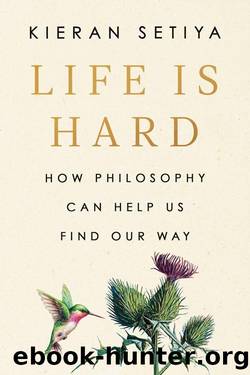Life Is Hard by Kieran Setiya

Author:Kieran Setiya [Setiya, Kieran]
Language: eng
Format: epub
Publisher: Penguin Publishing Group
Published: 2022-10-04T00:00:00+00:00
THERE ARE SOME who take the fact of suffering hard. Born in Paris on February 3, 1909, the philosopher Simone Weil lived to see her homeland under German occupation during World War II. Escaping with her parents to New York City before heading to London alone, she ate only the rations allowed in occupied France. It was a form of solidarity she had practiced all her life. âWhen she learned that soldiers at the front during the First World War were being denied their ration of sweets,â her biographer Palle Yourgrau writes, âyoung Simone abstained from chocolate.â She was less than ten years old. Teaching in France two decades later, Weil would give her salary to needy workers, refuse to heat her apartment when the unemployed could not afford to heat their own, and insist on doing factory and farm work that harrowed her frail physique. She would labor until shattered, unable to meet the pace of factory production lines. At the vineyard where she worked eight hours a day, she âwas often too tired to keep standing, and so continued to pick grapes lying down . . . she milked cows at dawn, peeled vegetables and, as always, helped the local children with their homework.â Weil died eventually of starvation, maintaining her self-imposed ration while suffering from tuberculosis in a sanatorium in Kent, on August 24, 1943. She did not complain. âWhat a beautiful room in which to die,â she had said of the place where her life would end.
There is a terrible logic to Weilâs self-sacrifice. It wasnât fair that she should eat while others starve, and since she could not feed them, she would starve herself. The principle is one she had framed in high school, in an essay written for âAlainââa pen name for Ãmile-Auguste Chartierâthe teacher of Raymond Aron, Simone de Beauvoir, and others. Weil recounts the story of Alexander the Great crossing the desert with his army in 325 BCE. When his soldiers brought him water in an upturned helmet, Alexander poured it out onto the sands. If he had drunk the water, Weil writes, âAlexanderâs well-being . . . would have separated him from his soldiers. . . . Every saint has poured out the water; every saint has rejected all well-being that would separate him from the suffering of men.â
There is an otherworldliness to Weil, a near-inhuman obstinacy. She was nicknamed âLa Trollesseâ by her family, âthe Martianâ by Alain, by others âthe Red Virginâ and âthe Categorical Imperative in skirts.â (The Categorical Imperative was Immanuel Kantâs strict formulation of the moral law.) Trapped in London in 1942, Weil campaigned for a squadron of nurses to be air-dropped at the front lines of the war; she would lead them herself. âThe project may appear impracticable at first sight,â Weil grants, âbecause of its novelty.â But she was deadly serious.
Raised as a secular Jew, Weil went on to have profound experiences of Christ, first while visiting Assisi in 1937, then at the Benedictine abbey of Solesmes the following year.
Download
This site does not store any files on its server. We only index and link to content provided by other sites. Please contact the content providers to delete copyright contents if any and email us, we'll remove relevant links or contents immediately.
The remains of the day by Kazuo Ishiguro(8979)
Tools of Titans by Timothy Ferriss(8369)
Giovanni's Room by James Baldwin(7330)
The Black Swan by Nassim Nicholas Taleb(7110)
Inner Engineering: A Yogi's Guide to Joy by Sadhguru(6785)
The Way of Zen by Alan W. Watts(6601)
Asking the Right Questions: A Guide to Critical Thinking by M. Neil Browne & Stuart M. Keeley(5761)
The Power of Now: A Guide to Spiritual Enlightenment by Eckhart Tolle(5760)
The Six Wives Of Henry VIII (WOMEN IN HISTORY) by Fraser Antonia(5503)
Astrophysics for People in a Hurry by Neil DeGrasse Tyson(5182)
Housekeeping by Marilynne Robinson(4436)
12 Rules for Life by Jordan B. Peterson(4299)
Double Down (Diary of a Wimpy Kid Book 11) by Jeff Kinney(4261)
Ikigai by Héctor García & Francesc Miralles(4247)
The Ethical Slut by Janet W. Hardy(4242)
Skin in the Game by Nassim Nicholas Taleb(4239)
The Art of Happiness by The Dalai Lama(4125)
Skin in the Game: Hidden Asymmetries in Daily Life by Nassim Nicholas Taleb(3992)
Walking by Henry David Thoreau(3953)
